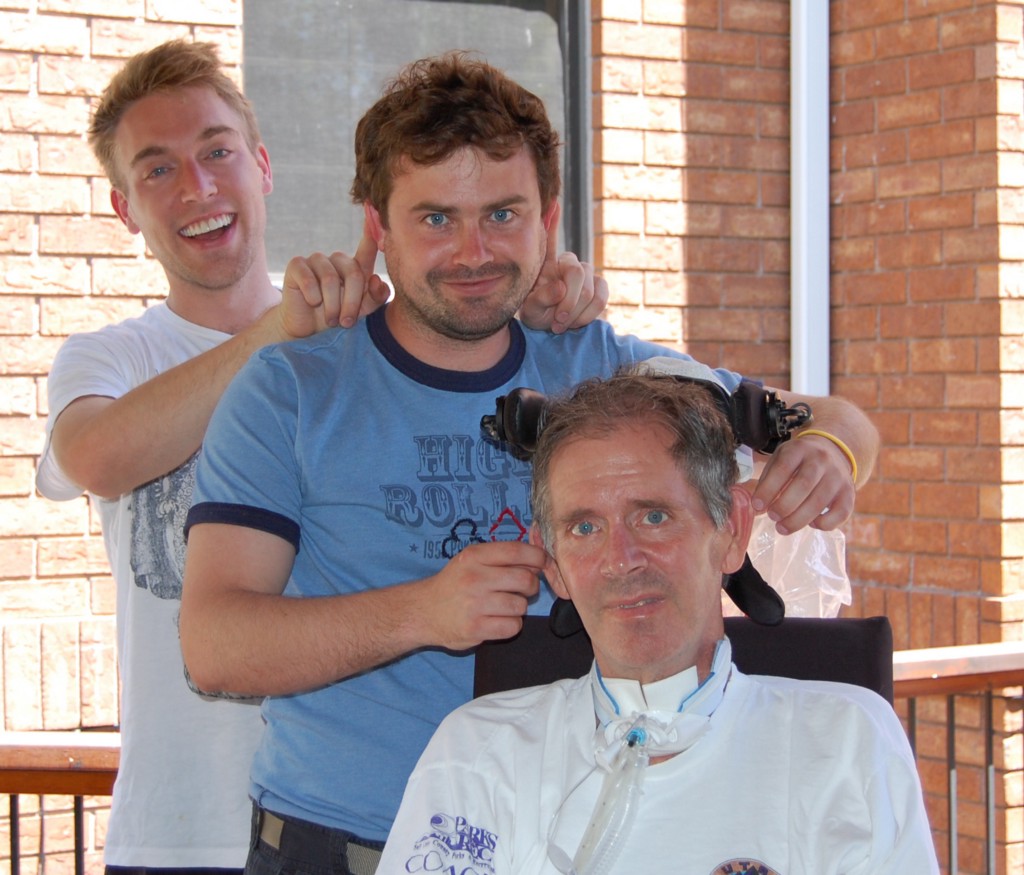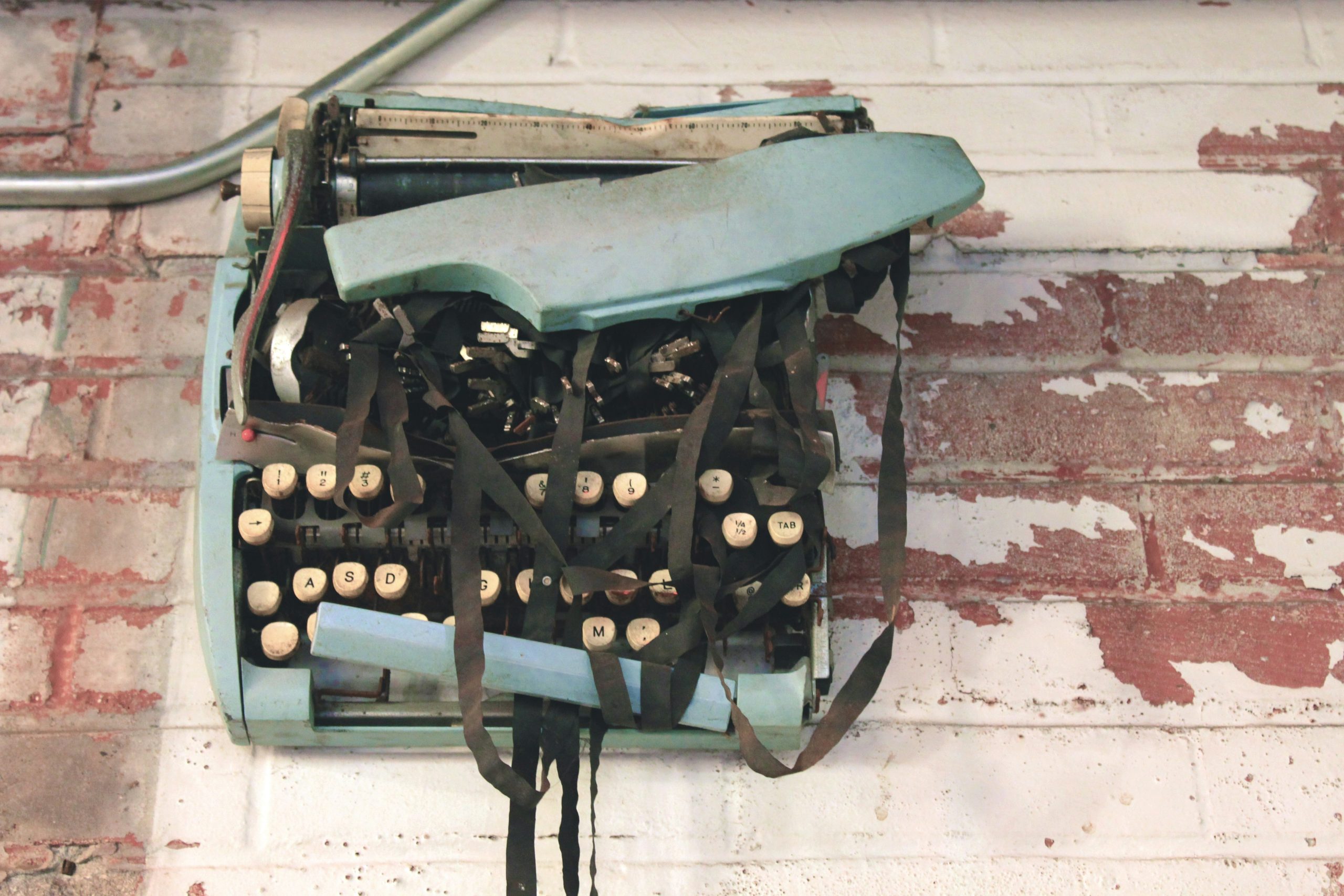interviews
Only We Know What That Was Like
Greg Marshall interviews his brother Dan Marshall about his ALS memoir "Home Is Burning"

It’s a Wednesday night in late October. We’re at Barnes & Noble at The Grove in Los Angeles. My brother, seated on a book-signing stage in front of a wall of turquoise copies of his memoir Home Is Burning, has just finished reading excerpts about washing my dad’s balls for the first time and, later, programming profanity into his talking computer. Danny is unabashed on the page but when he reads a joke about me being well versed in giving and receiving blowjobs, he winces, runs a hand through his sun-kissed hair and smiles at me in the audience. “Sorry, Greg.”
It’s surreal sitting here in the second row, like the dénouement of a horror movie in which the survivor has written a tell-all bestseller about his harrowing escape from a serial killer, except, in this case, the serial killer is Lou Gehrig’s disease. Just as in a horror movie, the “sequel” will be meta as my brother is adapting Home Is Burning for New Line Cinema with Miles Teller set to produce and star. Jonathan Levine, who helmed the cancer bromedy 50/50, has signed on to direct.

My brother takes a few pro forma questions from the audience about converting his blog into a book and then someone I don’t recognize shouts from the back, “Tell us about Greg.”
“Greg is my best friend,” Danny says without missing a beat. He says other nice things about me — making sure to plug the collection of essays I’m trying to sell — and then, unable to help himself, visibly pained, he adds that during one of our recent marathon phone conversations — it’s not uncommon for them to hit the two-hour mark — I pointed out that Dad had a gorgeous cock. My point was not that I wanted to do anything with it, just that it would have been embarrassing if Dad didn’t have a gorgeous cock given that so many people handled it while caring for him.
The fact that Danny brings up my phallic observation at his book launch, the fact that I am bringing it up now in spite of blushing and putting my hands over my eyes and rocking in my chair like an autistic person upon hearing it, tells you everything you need to know about my family. I once heard the memoirist Louise Krug give a reading about suffering a stroke. Ultimately, her book was called Louise: Amended but the working title was This Is A Contest To See Who Is Bravest, which I always loved because it describes my family. For the Marshalls, life is a contest to see who is _____-est. Bravest. Weirdest. Grossest. We take our lack of filter to superlative heights. If Danny mentions I think Dad had a gorgeous cock, I’ll make a mental note to bring up its frequent state of half-tumescence, leftward tilt and soft foreskin the next chance I get. It’s not brashness that makes me do it, and certainly not bravery. I just can’t help myself. I’m a Marshall.
Greg Marshall: One thing that really annoys me in all of these glowing reviews of your book is that they never fail to point out how inept we were at caring for Dad while he was on a respirator. Entertainment Weekly describes us as having “near-patricidal levels” of incompetence, like it’s so easy to manage a man who is hooked to a machine.
Dan Marshall: We weren’t as bad at taking care of Dad as it seems in the book. We did a lot of things right. I know we always would talk about how our friends, if faced with that situation, would also probably make a lot of mistakes and not handle it well. No one handles Lou Gehrig’s well. It’s impossible. We did okay. But if I came out and said that we were really great at taking care of Dad, I think people would like us less because it would seem like I was bragging, or that I was painting us as being really great.
We were a weird mix of competent and incompetent. Sometimes we’d be rocking and rolling, but then Dad would get stuck in the [home] elevator or something. It seemed like we’d do nine things right, but then one thing wrong. I think I focused more on the one thing we did wrong so we could hopefully get it right.
GM: Remember the time you performed mouth to mouth on the hole in dad’s neck?
I stopped drinking because I didn’t want to do anything to fuck up the opportunity to get the book published.
DM: That was a good example of our competent/incompetent mix. That happened the night after [our sister] Tiffany’s birthday party, so I was really, really hung over. Mom was watching Dad, and she wasn’t quite an expert at looking after him yet. Then, as she was cleaning around the trach hole, she accidentally yanked the trach tube out. Had I not had so much to drink, I would’ve been taking care of Dad instead of Mom, and his trach tube would not have been pulled from his throat (I assume). I remember trying to get the trach tube back in as Dad was bleeding, but couldn’t, so I started giving him mouth to mouth until the ambulance came.
In that situation, we fucked up pretty bad, but then ended up saving him. Shit like that happened all the time.
GM: Reading the book recently, it struck me how much alcohol you consumed over the year Dad was on a respirator. I mean, I was there for most of the basement drinking, but there was something about seeing it on the page that was like, “Oh, Danny was drinking himself to death. How did I completely miss that?” I know that you stopped drinking the day your editor came back with notes and haven’t had a drink since. I guess my question is: how did working on the book affect your sobriety?
DM: I stopped drinking because I didn’t want to do anything to fuck up the opportunity to get the book published. The night before I got my editorial notes, I went out to a dinner party, then drank so much I fainted. Smashed my face up a bit. Had to get a few stitches and spend a night in the emergency room. So it hit me: I needed to take a break from drinking. I think I said three months initially.
When I started reworking the book, I realized I was really using alcohol to self-medicate when Dad was sick. Alcohol makes me happy. I’m a very happy drunk who makes a lot of plans and promises while shitfaced. I once woke up to discover that I’d promised a girl I could get her a discount on Lasik eye surgery, for example.
During this time with Dad, I wasn’t using alcohol to have fun. It was my anti-depressant, which was dangerous when mixed with my actual anti-depressant. Alcohol shouldn’t be an anti-depressant. When you get to that point of abuse, you have to take a look at your life and see if the booze is actually adding value. It wasn’t. I felt like there was nothing else positive I could do with alcohol. All negative. I continued to not drink past the three-month marker and haven’t had a drop in over a year now.
GM: Are you done forever?
DM: I’d like to get to a point where I feel comfortable having a beer or glass of wine, but I think my days of getting blackout drunk on a regular basis are over.
GM: How weird is it having strangers writing and talking about our family like they know us? Mostly, I think it’s pretty hilarious. I do occasionally find myself getting defensive.
DM: It’s pretty weird. I try not to read anything on Goodreads. It just makes me angry because I feel like the people are wrong. You can’t please everyone though. Some people aren’t going to like the book because of the language and bluntness, and they’re just never going to turn that corner and start to like me. It’s hard not to write back to some reviewers, but that’s what they’re trying to get you to do, so you can’t. This has all been a test in thickening my skin for sure and realizing that I’m going to piss some people off. You really have to try to have a “who gives a fuck” attitude.
GM: Who was the hardest family member to write about?
DM: Dad is hard to write about because he was such a nice guy. He never gave anyone any reason to dislike him. Likability can be boring in some ways. I also had a really nice relationship with Dad. It would’ve been easier to write about him if we had a shitty relationship, would’ve given me more dirt, more to be angry about.
GM: Mom’s evolution from hating your book to begrudgingly adoring it has been fascinating. As you mention in the epilogue, when she first read Home Is Burning she threatened to sue you for character defamation, and I know that I fielded a few sobbing phone calls in the months you were revising the book. “How could Danny write this about me?” Contrast that with last June, when I sat with her during one of her infusions at Huntsman Cancer Institute: she was passing around promotional material from the Book Expo of America, where your memoir was a buzz book. One or two of her nurses even said they’d preordered Home Is Burning. What do you think changed for her?
It’s been a nice replacement for therapy. But I’ve had to think about Dad’s death and that horrible year an unhealthy amount.
DM: She started to see how much readers loved her in the book. She steals the show. Just about every reader says that she was the best and most relatable part of the book. At BEA, she was a bigger hit than me — a much bigger hit. I think once she realized that I wasn’t trying to write about her to hurt her, but rather to share her sense of humor and awesomeness with the world, she had a change of heart.
GM: You showed an incredible amount of emotional resiliency editing the book over the past year. Last time I checked, I think Tiff has managed to make it to page 29 before the tears have blinded her and she’s had to stop. Now that the book is out there, I wonder if writing it helped you get over Dad’s death.
DM: Yes and no. Writing about it certainly helped me understand Dad’s death more, and helped me realize how it fucked me up. It’s been a nice replacement for therapy. But I’ve had to think about Dad’s death and that horrible year an unhealthy amount. Dad was diagnosed nine years ago now. And has been dead for over seven. Though I’ve worked on a bunch of other stuff in that time, one of my main projects has been Home is Burning, so I’ve had to re-live a very hard time in our lives over and over and over again.
Now that the movie rights have sold, I’ve had to write about it in script form. I’m not complaining at all because when I write I feel like I’m spending time with Dad, which is nice, but it’s hard to think about how good our lives were before all this happened. It makes me wish things would go back to how they were when Dad was alive and healthy.
GM: I remember going to a screening of the documentary So Much So Fast shortly after Dad was diagnosed. I think you were still living in Los Angeles at the time. One of the brothers in the film says ALS either brings families closer together or tears them apart. I think both happened to our family. What do you think?

DM: I think it brought us all closer together. I was living in California, you in Illinois, Tiffany was about to move to Maine. We were all getting further and further apart. Sure we’d have holidays and some family vacations, but we were very much on different paths. This situation brought us back together, physically, then as the tragedy progressed, it brought us all together emotionally. I recreated the story for readers, and tried to make it as close as possible to how I remember living it, but it still isn’t the same as actually living it. Only we know what that was like. So I would like to think that we’re closer. I was already close to you, but I realized more than ever how important you were to me, that having someone to talk about life with that shares your perspective and experiences is truly the greatest thing on earth. And Tiffany, we hated each other, but now we’re really close. Jessica and Chelsea [our younger sisters] still suck though. Fuck them.
GM: Mom worked as a journalist before having kids and wrote an inspirational feature column about her battle with non-Hodgkin’s lymphoma when we were growing up. I’m working on a collection of essays about our childhood, and of course you’re a screenwriter and memoirist. What’s it like being a part of a family of writers?
DM: It’s a little bit weird, but also awesome. It’s amazing how different all of our styles are. I think I write in a more straightforward, dumbed-down way, whereas your writing is much more beautiful, poetic and descriptive. I always say that I write at about a fifth-grade reading level and you write at a college reading level. Then Mom’s writing, when she used to write, was really sentimental.
We’re drawing from the same well of material, so sometimes our buckets bump.
Some things can be a little bit weird, though. We’re drawing from the same well of material, so sometimes our buckets bump. I started writing about the Lou Gehrig’s mess while it was happening, so I feel like you sort of gave that material to me. Meanwhile, you’ve focused more on writing about your childhood. So we sort of divided up the material a little bit. It might get a little weird if you write a book about Lou Gehrig’s disease or I write one about our childhood. But for now, it seems like we’ve made it work.
I think it would be really cool if your book was published, and then Mom wrote a book about what life is like after Dad died. We’d have a sort of before, during, after account of our lives…to see how we were affected by Lou Gehrig’s disease.
GM: We’d be a box set.
DM: Yeah, a box set of tragedy.








